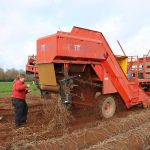B.C. biofuel maker BioStreet Canada says it’s been granted the provincial environmental permit it needs to move ahead on its planned biodiesel crusher and refinery at Vegreville, Alta.
Company president Darrell Michaels described the province’s approval in a release Wednesday as a “significant milestone” for the $210 million project, dubbed Vegreville Energy.
BioStreet bills its project as “the first fully integrated large-scale biodiesel facility in Canada, the second largest in North America and the fifth largest in the world.”
The Kelowna company’s project has faced a number of setbacks since it was first announced in 2007. Construction was originally expected to begin in 2008 for completion this year.
Read Also

Pea, lentil outlooks have some positive signals – Penner
As pulse growers consider what to plant this spring, Chuck Penner of Leftfield Commodities Research said there is some optimism in the Canadian pulse market. Penner gave a presentation at the Saskatchewan Pulse Growers meeting in Swift Current on Feb. 4.
However, company vice-president Angela Reid said in an interview Wednesday, the provincial permit was the biggest of the approvals needed to build at Vegreville.
BioStreet, she said Wednesday, “could possibly do surface work before the end of the year” and have its completed facility commissioned by the end of 2011 based on an aggressive construction schedule.
Remaining approvals include a development permit from the Town of Vegreville, which has already rezoned the company’s chosen site to allow the project to begin, she said.
“Significant volumes”
The project also requires a federal permit to be eligible for funding under the federal government’s ecoAgricultural Biofuels Capital (ecoABC) initiative.
The ecoABC program provides federal loans to build or expand approved transportation biofuel production plants that use agricultural feedstocks and include investment by farmers.
The deadline for companies to build or finish expansion work on ecoABC-funded biofuels facilities was recently extended from March 31, 2011 to Sept. 30, 2012, giving developers more time to line up their financing and complete construction.
BioStreet plans to move forward with the intent and confidence that it will be eligible for ecoABC funding, Reid said.
Vegreville Energy, when built, is now expected to have capacity to process 1,500 tonnes of canola per day (500,000 tonnes per year) and to produce over 225 million litres of biodiesel annually plus “significant volumes” of commercial meal, glycerine and fertilizer.
According to the ecoABC website, the Vegreville project’s eligible costs — which, upon its program registration in 2008, were based on spadework in 2009, commissioning in October 2010 and a lower capacity of 170 million litres of biodiesel per year — were over $52.8 million.
At that time, farmer equity investment in the Vegreville project was pegged at a total stake of five per cent.















